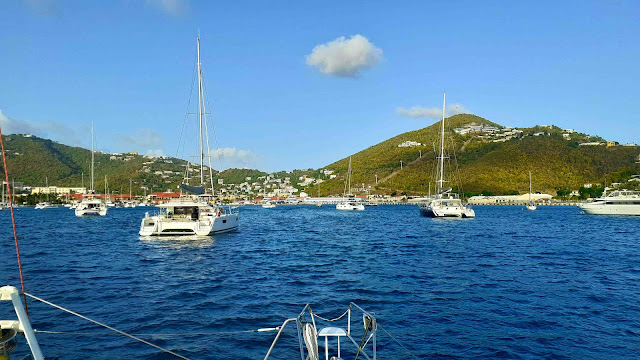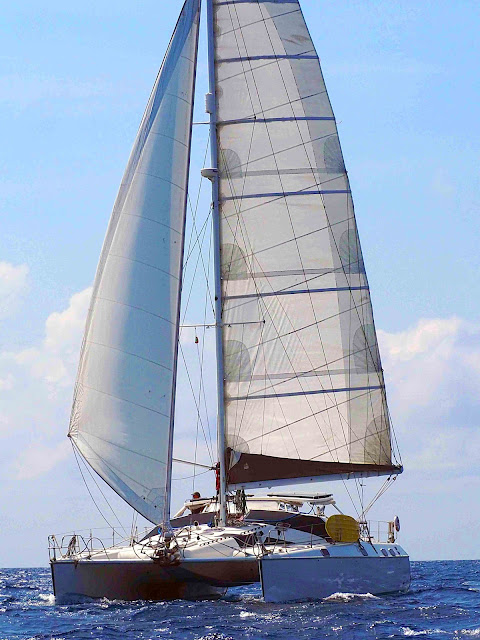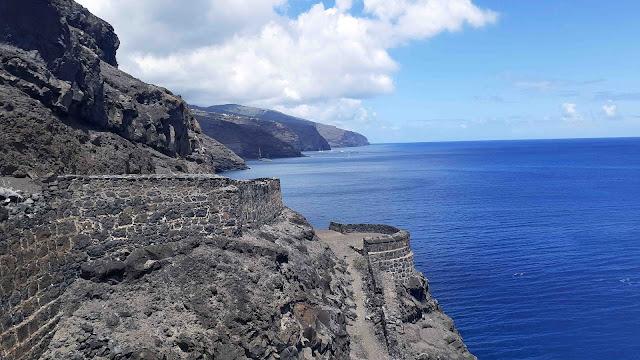 |
The trip seems so short on paper
|
We have completed our Atlantic crossing and again have decent Internet access and a little bit of time and energy. I write this from Perry on the hardstand at Peake Yacht Services in Chaguaramas, Trinidad. We're here to fix the hull paint that was damaged in Galle (by the way, the ferry that we saw in Galle on its delivery voyage is here in Chaguaramas), change our cutlass bearings, and a few other projects.
 |
Morro do Pico (Peak Hill) in Fernando de Noronha, Brazil
|
I have added pictures to the blog entry about St. Helena that was made from our satellite email, originally with text only.
After we left St. Helena, we made a 13-day passage (1804 nm) to Fernando de Noronha, Brazil. It was the second longest passage we have ever made. We were very happy to have satellite email updates from family and friends along the way because it turns out that being stuck on a boat for almost two weeks without very good sleep can get tedious.
On the plus side, after a slow start, we had decent wind for most of the trip. The constant squalls kept us on our toes and required frequent sail changes, but at least we were sailing. We motored for about 11 hours on the last day, as our wind disappeared.
Fernando de Noronha is kind of a mini-Hawaii for Brazilians. The scantily-clad, mostly Brazilian tourists were a far cry from the conservatively dressed crowd we have become accustomed to over the years. The Brazilian Brazilians were on prominent display with rear-end photo ops being the local twist on selfies. The main activities in Fernando de Noronha (besides seeing and being seen) are spending time at the beach, snorkeling, diving, and surfing. Matt and the boys enjoyed body surfing and Conrad rented a board for a few hours.
It is one of the most expensive places we have been and we only stayed four days. Matt repaired the top car of the mainsail track, whose pin had bent. This consisted of bending the pin back into shape (think a beefy vice and lots of hammering) until we can get somewhere to get a replacement. It was nice to have a break before moving on to our next destination: French Guiana (or straight to Trinidad, depending on conditions and timing).
 |
Prison cell on Ile Royale
|
Matt chose our route to minimize the time spent in the ITCZ (the doldrums) and maximize the current that runs along the coast. The strategy worked well and we had three days in a row on this leg where we sailed more than 200 nautical miles a day. We motored for about 5 hours total, typically when squalls sucked away our wind. This was also during the time when our generator was acting up and we needed to charge the batteries with the engine anyway. Our fairly boring passage was rudely interrupted by the aforementioned generator at (of course) 3:00 a.m. It got a bug up its butt and decided to start putting out more than 300 volts (it's only supposed to put out 230 volts). Fortunately, though our Sterling battery chargers are only spec'd to handle 270 volts, they were able to handle the additional power without frying. Had we been running the watermaker at the time, we would probably have burned out the pump.
 |
The repaired AVR
|
Matt sent a satellite email out to cruising friends and got some helpful advice that confirmed his suspicions. The AVR (automatic voltage regulator) had failed. Matt was able to pull the board out and identify the issue: a broken wire connecting one of the components to the circuit board. Luckily he was able to fix it by epoxying the loose component (the glue holding the component down had failed, and the vibrating component had eventually cracked the wire) and soldering in a jumper wire. Fortunately, the sea state wasn't too rocky for all this, though being stuffed into a cramped engine room underway is no one's idea of fun.
 |
Ile du Diable (Devil's Island) - Because it was impossible to land a boat, a cable car carried prisoners across strong currents and shark-infested waters
|
We decided to stop in French Guiana because had we kept going, we would have gotten to Trinidad on the weekend (Easter weekend), which would have meant overtime charges and closed offices. In total, it took us eight days (1378 nm) to get to Iles du Salut, which is comprised of three islands (Ile Royale, Ile Saint-Joseph, and Ile du Diable--Devil's Island) used by France to house prisoners. Papillon and The Dreyfus Affair made famous Devil's Island (where political prisoners were kept in horrendous conditions). Ile Royale is now idyllic and swarming with tourists, so it's hard to get a feel for the oppression that the prisoners must have endured.
 |
Peacocks roam Ile Royale
|
 |
An 'open air' cell on Ile Saint-Joseph, where the worst of the worst prisoners were kept, exposed to the elements.
|
After two days at Iles du Salut, we started on the final leg our of our Atlantic voyage. Our 4-day passage to Chaguaramas, Trinidad was a mixed bag. Our first day was 214 nautical miles, which is one of fastest days we have ever had. On days two and three, the wind and current moderated a bit and as we approached the coast of Trinidad, we still had 60 miles to go and only a few hours of daylight left. So we slowed down to make sure we would arrive the following morning. We passed a couple oil rigs, one of which lit up the night sky with an eerie orange glow.
We'll spend a week or two in Chaguaramas (hopefully no longer than that, though boat yards have a tendency to suck you in). The boat yard is remote and you need a car to get groceries and most other things, though within walking distance there is a Budget Marine and an expensive convenience store that carries produce. Fortunately, Peake Yachts provides a free shuttle to the mall and grocery store and the facilities here are nice. That's okay--there are fewer distractions; all the better to get our work done.

























